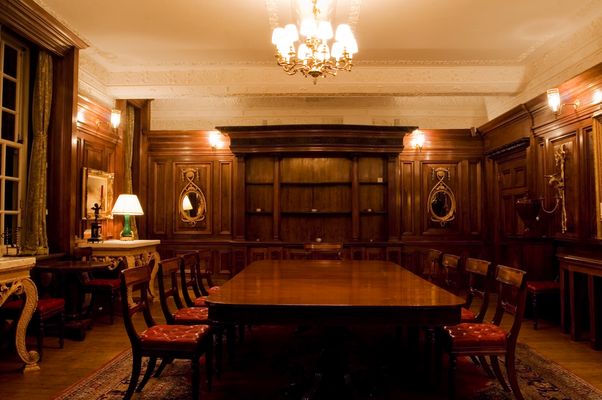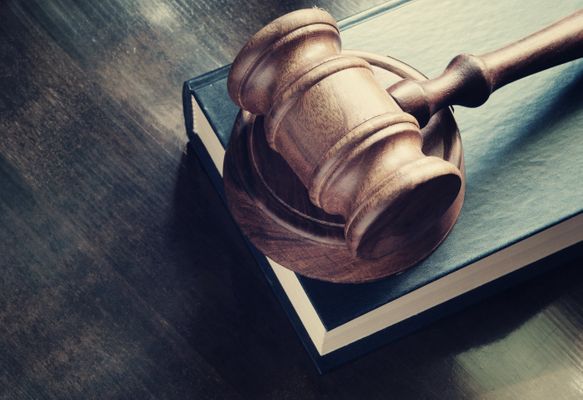1.1.3
Henry VII's Councils & Parliament
Henry VII's Councils
Henry VII's Councils
Henry VII needed to build control over England. He developed councils to focus on specific issues or problems.


The Royal Council
The Royal Council
- The Royal Council advised Henry and helped him with day-to-day government.
- Although 227 men were listed, it was a much smaller group that met.
- John Morton and Reginald Bray were two important councillors.


The Council Learned in the Law
The Council Learned in the Law
- This council was very unpopular.
- Its aim was to pursue Henry VII’s feudal rights (the various financial payments and soldiers owed to the monarch in return for the land he owned and distributed).
- The Council Learned in the Law investigated feudal rights that were forgotten or had lapsed.
- It also enforced bonds and recognisances (obligations to perform certain actions before court).
- The council increased Crown revenue and kept nobles under scrutiny.


Regional government
Regional government
- Henry VII had a much stronger hold over areas in the south and east of England than the north. He needed to make sure he had control over the potentially troublesome parts of the kingdom.
- Henry VII recognised that he needed to have the cooperation of local noblemen (who could be more popular than him).
- He allowed different systems of government for different regions.
- For example, Wales was controlled by the Council of Wales.
- Henry VII relied on Justices of the Peace (JPs) to maintain order.


The Privy Chamber
The Privy Chamber
- The Privy Chamber was based in the most intimate of Henry VII’s private rooms. Its staff saw to the monarch’s personal needs, so had great access to him.
- Privy Chamber staff could potentially influence the king’s decisions.
- The Privy Chamber was staffed by lower ranking members of the Royal Household, not nobles.
- Henry VII increasingly relied on his Privy Chamber after the treason of Sir William Stanley and other leading members of his Household in 1495.


Historical assessment
Historical assessment
- Historian Steven Gunn (2016) argues that the "new men" of Henry VII's reign were important in changing the way that Tudor monarchs governed:
- 'The strengths of the regime they helped to build enabled his son’s yet more ambitious undertakings and in some ways shaped their direction, in his assault on the church’s wealth and jurisdiction, his on-going centralization of power and elaboration of administrative machinery.'
Henry VII and Parliament
Henry VII and Parliament
Henry VII summoned parliament seven times during his reign. He usually wanted extra taxation, Acts of Attainder or important but unpopular measures. Statute law had the support of the political classes: gentry, leading town citizens, nobles and higher clergy.


Henry VII's first parliament
Henry VII's first parliament
- Parliament helped Henry VII consolidate control after Bosworth.
- Parliament granted Henry VII customs duty for life. This was standard practice.
- Acts of Attainder were issued against those who had fought Henry VII at Bosworth.
- The 1486 Act of Resumption returned to the Crown all the land it had granted away since 1455.


Parliament and taxation
Parliament and taxation
- Only Parliament could allow extra taxation.
- Parliament did this for Henry’s foreign policy in 1489 (Brittany), 1491-2 (France).
- However, when the Crown became wealthier, Henry VII became less dependent on Parliament.


Parliament and law and order
Parliament and law and order
- Parliament passed laws to strengthen law and order.
- Parliament established the Star Chamber in 1487.
- It passed a law to give JPs more powers in 1495.
- Parliament could pass Acts of Attainder (meaning it could assume judiciary powers). These were needed after the Battle of Stoke (1487), the Northern Rebellion (1489) and against Sir William Stanley (1495).


Henry's use of parliament
Henry's use of parliament
- Henry VII called parliament only when necessary.
- Statute law was stronger than royal proclamations. It was used to enforce important, more unpopular, policies.
1Consolidation of the Tudor Dynasty 1485-1547
1.1Henry VII 1485-1509
1.1.1Henry VII's Consolidation of Power
1.1.2Henry VII & Succession
1.1.3Henry VII's Councils & Parliament
1.1.4End of Topic Test - Henry VII Part 1
1.1.5Henry VII & Justice, Finance & Policies
1.1.6Henry VII's Relationship with Foreign Powers
1.1.7Henry VII & Society
1.1.8End of Topic Test - Henry VII Part 2
1.1.9Henry VII & Regional Issues
1.1.10Henry VII & Economic Development
1.1.11Henry VII & Cultural Development
1.1.12End of Topic Test - Henry VII Part 3
1.2Henry VIII 1509-1547
1.2.1Henry VIII's Consolidation of Power
1.2.2Henry VIII & His Government
1.2.3Henry VIII & His Government 2
1.2.4End of Topic Test - Henry VIII Part 1
1.2.5Henry VIII & Succession
1.2.6Henry VIII's Relationship with Foreign Powers
1.2.7Henry VIII & Society
1.2.8End of Topic Test -Henry VIII Part 2
1.2.9Henry VIII & Society 2
1.2.10Henry VIII & Economic Development
1.2.11Henry VIII & Religion
1.2.12End of Topic Test - Henry VIII Part 3
2England: Turmoil & Triumph 1547-1603
2.1Instability & Consolidation 1547-1563
2.1.1Edward VI, Somerset & Northumberland
2.1.2Edward VI & Authority
2.1.3Edward VI & Relations with Foreign Powers
2.1.4End of Topic Test - Edward VI Part 1
2.1.5Edward VI & Rebellions
2.1.6Social Impact of Religious & Economic Changes
2.1.7Edward VI & Cultural Developments
2.1.8End of Topic Test - Edward VI Part 2
2.1.9Mary I & Her Rule
2.1.10Mary I & Relations with Foreign Powers
2.1.11The Social Impact of Religious & Economic Change
2.1.12End of Topic Test - Mary Part 1
2.1.13Elizabeth I & Her Rule
2.1.14Elizabeth I & Relations With Foreign Powers
2.1.15Impact of Economic, Social & Religious Change
2.1.16End of Topic Test - Elizabeth I Part 1
2.2The Triumph of Elizabeth 1563-1603
2.2.1Elizabeth I & Court
2.2.2Elizabeth & Government
2.2.3Elizabeth I & Succession
2.2.4End of Topic Test - Elizabeth I Part 2
2.2.5Mary Queen of Scots
2.2.6Relations with Spain
2.2.7End of Topic Test - Elizabeth I Part 3
2.2.8Elizabeth I & Society
2.2.9Elizabeth I & Rebellion
2.2.10Elizabeth & Economic Development
2.2.11End of Topic Test - Elizabeth I Part 4
2.2.12Elizabeth I & Religious Developments
2.2.13The English Renaissance
2.2.14Elizabeth's Last Years
2.2.15End of Topic Test - Elizabeth I Part 5
Jump to other topics
1Consolidation of the Tudor Dynasty 1485-1547
1.1Henry VII 1485-1509
1.1.1Henry VII's Consolidation of Power
1.1.2Henry VII & Succession
1.1.3Henry VII's Councils & Parliament
1.1.4End of Topic Test - Henry VII Part 1
1.1.5Henry VII & Justice, Finance & Policies
1.1.6Henry VII's Relationship with Foreign Powers
1.1.7Henry VII & Society
1.1.8End of Topic Test - Henry VII Part 2
1.1.9Henry VII & Regional Issues
1.1.10Henry VII & Economic Development
1.1.11Henry VII & Cultural Development
1.1.12End of Topic Test - Henry VII Part 3
1.2Henry VIII 1509-1547
1.2.1Henry VIII's Consolidation of Power
1.2.2Henry VIII & His Government
1.2.3Henry VIII & His Government 2
1.2.4End of Topic Test - Henry VIII Part 1
1.2.5Henry VIII & Succession
1.2.6Henry VIII's Relationship with Foreign Powers
1.2.7Henry VIII & Society
1.2.8End of Topic Test -Henry VIII Part 2
1.2.9Henry VIII & Society 2
1.2.10Henry VIII & Economic Development
1.2.11Henry VIII & Religion
1.2.12End of Topic Test - Henry VIII Part 3
2England: Turmoil & Triumph 1547-1603
2.1Instability & Consolidation 1547-1563
2.1.1Edward VI, Somerset & Northumberland
2.1.2Edward VI & Authority
2.1.3Edward VI & Relations with Foreign Powers
2.1.4End of Topic Test - Edward VI Part 1
2.1.5Edward VI & Rebellions
2.1.6Social Impact of Religious & Economic Changes
2.1.7Edward VI & Cultural Developments
2.1.8End of Topic Test - Edward VI Part 2
2.1.9Mary I & Her Rule
2.1.10Mary I & Relations with Foreign Powers
2.1.11The Social Impact of Religious & Economic Change
2.1.12End of Topic Test - Mary Part 1
2.1.13Elizabeth I & Her Rule
2.1.14Elizabeth I & Relations With Foreign Powers
2.1.15Impact of Economic, Social & Religious Change
2.1.16End of Topic Test - Elizabeth I Part 1
2.2The Triumph of Elizabeth 1563-1603
2.2.1Elizabeth I & Court
2.2.2Elizabeth & Government
2.2.3Elizabeth I & Succession
2.2.4End of Topic Test - Elizabeth I Part 2
2.2.5Mary Queen of Scots
2.2.6Relations with Spain
2.2.7End of Topic Test - Elizabeth I Part 3
2.2.8Elizabeth I & Society
2.2.9Elizabeth I & Rebellion
2.2.10Elizabeth & Economic Development
2.2.11End of Topic Test - Elizabeth I Part 4
2.2.12Elizabeth I & Religious Developments
2.2.13The English Renaissance
2.2.14Elizabeth's Last Years
2.2.15End of Topic Test - Elizabeth I Part 5
Unlock your full potential with Seneca Premium
Unlimited access to 10,000+ open-ended exam questions
Mini-mock exams based on your study history
Unlock 800+ premium courses & e-books